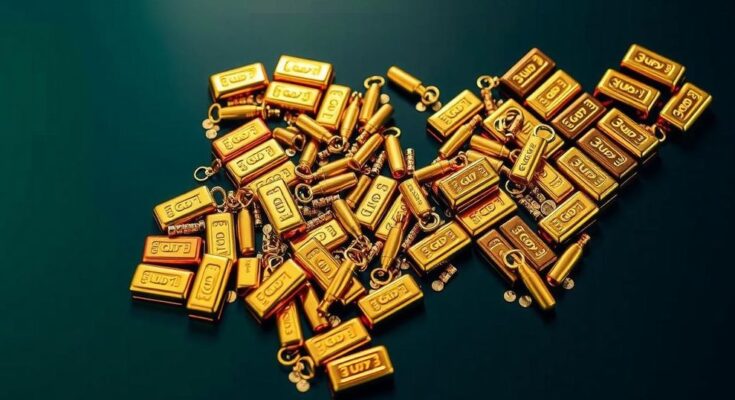Dele Alake, Nigeria’s Minister of Solid Minerals Development, announced the smuggling of substantial gold exports to the UAE, leading to a revenue loss of $9 billion annually. He proposed a partnership with the UAE to establish regulations to combat illegal gold trade and enhance economic benefits. The UAE Ambassador affirmed commitment to strengthening ties and exploring collaborative strategies to address the challenge.
The Minister of Solid Minerals Development, Dele Alake, has disclosed that a significant portion of Nigeria’s gold output is illicitly smuggled into the United Arab Emirates (UAE). This illicit trade has resulted in Nigeria losing a crucial source of tax revenue and royalties linked to unreported gold exports. Reports from the House of Representatives Committee on Solid Minerals indicate that Nigeria suffers losses amounting to $9 billion each year due to illegal mining operations. In light of these challenges, Minister Alake has proposed a collaborative initiative between Nigeria and the UAE aimed at establishing comprehensive regulatory frameworks to alleviate illegal gold exports and enhance economic profitability for both nations. During a meeting with UAE Ambassador to Nigeria, Salem Al Shamsi, in Abuja, Mr. Alake underscored the importance of a partnership aimed at solidifying the UAE’s status as a pivotal hub for mineral trade. Mr. Alake further expressed a keen interest in collaborating with the UAE on technology transfer initiatives to modernize Nigeria’s mining sector. “In the mining sector, we see significant opportunities for collaboration. While there is considerable trade in gold, much of it remains illegal, with a large portion of Nigerian gold ending up in the UAE unlawfully. We propose working together to develop strategies to curb illegal gold trade and establish a regulatory framework that legitimises this trade, allowing both countries to maximise their benefits,” he stated. Ambassador Al Shamsi reaffirmed the UAE’s commitment to enhancing its relationship with Nigeria, highlighting the recent easing of visa restrictions and the establishment of a Memorandum of Understanding (MOU) between UAE businesses and Nigeria’s Solid Minerals Development Fund (SMDF). He remarked, “The lifting of visa application restrictions and the launch of a new visa application website demonstrate my country’s dedication to advancing bilateral relations.” Both nations have committed to forming a technical committee focused on exploring collaborative strategies to combat illegal mineral trade while promoting legitimate commerce. A report by SwissAid notes that the UAE has emerged as a principal destination for undeclared gold, with approximately 66.5% of the UAE’s gold imports from Africa in 2022 derived from smuggling activities. The report further asserts that between 2012 and 2022, 2,569 metric tonnes of African gold, worth $115.3 billion, entered the UAE unreported. Alarmingly, a significant portion of Nigeria’s gold, which is believed to be underutilized from a reserve of 21.37 tonnes located in Northern Nigeria and Osun State, remains unaccounted for. Despite the mining sector’s promise, its contribution to Nigeria’s overall economic growth is minimal, representing only 7.86% of the GDP as per the National Bureau of Statistics in the first quarter of 2024. Mr. Alake highlighted that the issue of illegal mining in Nigeria is exacerbated by the actions of foreign illegal miners who are often connected to activities such as banditry.
The illegal gold trade poses a significant challenge to the Nigerian economy, causing substantial revenue loss due to undeclared gold exports. The collaboration between Nigeria and the UAE is viewed as a potential solution to regulate gold exports more effectively, ultimately benefiting both nations economically. Reports indicate the UAE serves as a major global hub for gold trade, further complicating the fight against illegal mining and trafficking.
The discussion between Nigeria and the UAE reflects a proactive approach to mitigating the rampant illegal gold trade that undermines Nigeria’s economic potential. By fostering cooperation and developing a regulatory framework, both countries aim to not only curb illegal practices but also to enhance the overall profitability of the gold mining sector.
Original Source: www.premiumtimesng.com




